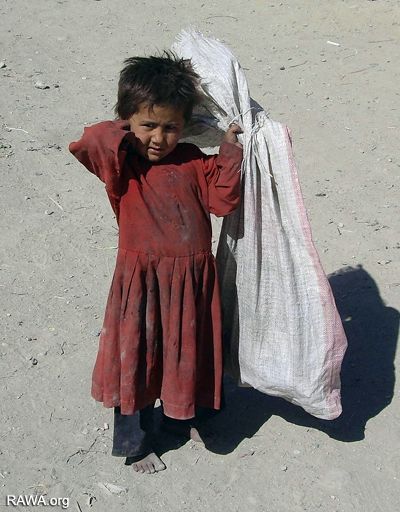By Jon Hemming
KABUL - Too much aid to Afghanistan is wasted -- soaked up in contractors' profits, spent on expensive expatriate consultants or squandered on small-scale, quick-fix projects, a leading British charity said on Tuesday.
Despite more than $15 billion of aid pumped into Afghanistan since U.S.-led and Afghan forces toppled the Taliban in 2001, many Afghans still suffer levels of poverty rarely seen outside sub-Saharan Africa.

"Afghanistan has received 12 billion $ in aid but there aren't any signs of serious reconstruction. Our people have not benefited from the billions of reconstruction dollars due to theft by the warlords or misuse by NGOs. Even a fraction of this aid has not been used for the benefit and welfare of our people. Government corruption and fraud directs billions of dollars into the pockets of high-ranking officials. It is such a big shame that the government still cannot provide electricity, food and water for its people."
Zoya's Speech, Oct.7, 2006
"The development process has to date been too centralized, top-heavy and insufficient," said a report by Oxfam.
By far the biggest donor, the United States approved a further $6.4 billion in Afghan aid this year, but the funds are spent in ways that are "ineffective or inefficient," Oxfam said.
The U.S. Agency for International Development (USAID) allocates close to half its funds to the five largest U.S. contractors in Afghanistan.
"Too much aid is absorbed by profits of companies and sub-contractors, on non-Afghan resources and on high expatriate salaries and living costs," the report said.
A full-time expatriate consultant can cost up to $500,000 a year, Oxfam said.
More money needed to be channeled through the Afghan government, strengthening its influence and institutions.
Aid also needed to be better coordinated to avoid duplication, it said.
Only 10 percent of technical assistance to Afghanistan is coordinated either with the government or among donors.
SECURITY DETERIORATES
Spending on development is dwarfed by that spent on fighting the Taliban. The U.S. military is spending $65,000 a minute in Afghanistan, Oxfam said.
The report called for the 25 provincial reconstruction teams (PRTs) run by the armies of 13 different nations across the country to withdraw where the security situation is stable enough and carry out relief work only where there is a critical need.
The PRTs, Oxfam said, "being nation-led are often driven more by available funding or the political interests of the nation involved rather than development considerations." The result was "a large number of small-scale, short-term projects."
"Given the historic suspicion of foreign intervention, such efforts to win 'hearts and minds' are naive. It is unsurprising that the huge expansion of PRT activities has not prevented the deterioration of security."
Violent incidents are up at least 20 percent since last year, according to U.N. estimates, and have spread northwards to many areas previously considered safe.
More than 200 civilians have been killed in at least 130 Taliban suicide bombs and at least 1,200 civilians have been killed overall this year -- about half of them in operations by Afghan and international troops.
Oxfam called on the 50,000 foreign troops in Afghanistan to take greater care not to hurt civilians, particularly in air strikes. The lower number of troops in Afghanistan than in Iraq -- less than a third as many in a much bigger country with a larger population -- leads to a greater reliance on air power.
There are four times as many air strikes in Afghanistan as in Iraq, Oxfam said.
The NATO-led force in Afghanistan says it takes every effort to avoid civilian casualties and has already modified procedures for launching air strikes resulting in fewer civilian deaths.



